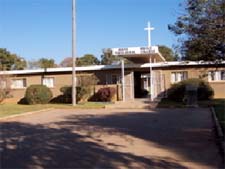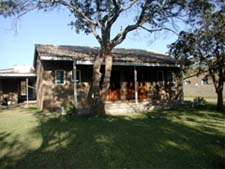Most South African towns have one. An NG Kerk that is. They stand in the centre of the town, often on high ground, surrounded by gardens, a marble obelisk or two, and have a huge white steeple, pricking the sky above. As a rule I do not venture into them, or even near...
Faith and church size
A new report from The Barna Group, based on interviews with more than 3,000 adults, shows that congregational size is related to the nature of a congregation’s religious beliefs, religious behavior and demographic profile. There are clearly significant differences...
Alan Roxburgh on the role of “judicatories”
You can also watch a video on the subject: http://roxburghmissionalnet.com/index.php?option=com_content&view=section&layout=blog&id=7&Itemid=89 Judicatories come in all shapes and sizes. They also come in many different forms, each with names that come...
Why Are You in Ministry? – John McLaverty
The most serious mistakes are not being made as a result of wrong answers. The truly dangerous thing is asking the wrong question - Peter Drucker After a couple of years of ‘coaching' pastors in partnership with both Allelon and RMN, I have come to the firm conclusion...
How the World Became a Corporation and How to Take it Back
Review of Life, Inc.: How the World Became a Corporation and How to Take it Back by Rushkoff To Read more of Alan Roxburgh you can connect with his online Newsletter: Send Alan Roxburgh & Team a mail to roxburghmissionalnet@gmail.com Monday, 10 August 2009...
The post-colonial challenge: Is your Gospel effective?
You will find this article and more on this topic at http://www.emergingafrica.info/ All across Africa there are churches. While there may be unreached parts, one cannot deny that Africa has churches practically everywhere. The Gospel is being preached in Africa, week...
Dying to Live: Theology, Migration, and the Human Journey
By Daniel G. Groody, c.s.c. Daniel G. Groody is a Roman Catholic priest, scholar, and award-winning author and film producer. He teaches at the University of Notre Dame, where he is Assistant Professor of Theology and Director of the Center for Latino Spirituality and...
CROSSING THE BAR – XVI : An Unnecessary God
CROSSING THE BAR – XVI
An Unnecessary God
By Jim Johnson
SOURCE: http://www.churchinnovations.org/05_news/pii_v8_i1/pii_v8_i1_johnson.html
In Easter we find a God who won’t share the throne of control. In Easter, God alone is God, doing what God alone can do, and that seems to be uncomfortable for both the churched and the un-churched alike.
I heard a story the other day about a fellow who wanted to build a bar on property that was too close, to their liking, to one of the local churches (though if the truth be told, they didn’t want a bar built anywhere at all). Their reasoning – and the reason given for their fervent opposition – was because of the perceived “negative moral impact” on the community as a whole and especially on “the children.” So, when the bar owner had announced his plans, the church railed against such an ungodly endeavor.
Trauma and conflict as prerequisites for identity transformation –
H Jurgens HendriksStellenbosch University, South Africa Trauma and conflict as prerequisites for identity transformation -lessons from the South African Partnership for Missional Churches ABSTRACT This paper researches the process of identity transformation that is...
“Mission in Western Culture Project” – Report – From Payette Lake (2006) to Lusaka (2008)
Introduction
This Report is written following the 3rd MIWC planning meetings held in Lusaka, Zambia over six days at the Justo Mwale Theological College in the Chamba Valley, Lusaka. These were God-given days for all of us in the Project. It was a turning point that refocused our vision and expanded the commitment of the people who came from twelve nations representing NA, the UK, Africa, Korea, Australia and New Zealand.
 We met on the campus of the Justo Mwali Seminary situated along a dusty, dirt road beside a growing community of homes most of us would consider substandard. We lived in small dormitories, each with desk and requisite candle for when the power went off. The dorms formed two sides of a courtyard in which we ate in the winter sun. On the third side stood the kitchen and showers, and on the other the Booth Center where we met.
We met on the campus of the Justo Mwali Seminary situated along a dusty, dirt road beside a growing community of homes most of us would consider substandard. We lived in small dormitories, each with desk and requisite candle for when the power went off. The dorms formed two sides of a courtyard in which we ate in the winter sun. On the third side stood the kitchen and showers, and on the other the Booth Center where we met.
 Our time was spent divided between meetings and off site visits. We gathered from Australia, Kenya, Korea, Malawi, New Zealand, Nigeria, North America, South Africa, United Kingdom, Zimbabwe, and Zambia. The consultation was something none of us anticipated. God showed us things we would never have understood staying in our contexts and cultures. In creating opportunities to cross boundaries, allowing those of us from the West to be the minority needing to listen attentively, we heard God in unexpected ways about the challenge of mission in the globalizing, multi-narrative worlds of late modernity. To make sense of why we came to Africa we must go back to the beginning of the project.
Our time was spent divided between meetings and off site visits. We gathered from Australia, Kenya, Korea, Malawi, New Zealand, Nigeria, North America, South Africa, United Kingdom, Zimbabwe, and Zambia. The consultation was something none of us anticipated. God showed us things we would never have understood staying in our contexts and cultures. In creating opportunities to cross boundaries, allowing those of us from the West to be the minority needing to listen attentively, we heard God in unexpected ways about the challenge of mission in the globalizing, multi-narrative worlds of late modernity. To make sense of why we came to Africa we must go back to the beginning of the project.
